The metaphors of information processing and computation are at the center of today's intellectual action. A new and unified language of science is beginning to emerge.

Participants:
 |
 |
 |
 |
 |
| Seth Lloyd | Paul Steinhardt | Alan Guth | Marvin Minsky | Ray Kurzweil |
| Computational Universe | Cyclic Universe | Inflationary Universe | Emotion Universe | Intelligent Universe |
What's happening in these new scientific endeavors is truly a work in progress. A year ago, at the first REBOOTING CIVILIZATION meeting in July, 2001, physicists Alan Guth and Brian Greene, computer scientists David Gelernter, Jaron Lanier, and Jordan Pollack, and research psychologist Marc D. Hauser could not reach a consensus about exactly what computation is, when it is useful, when it is inappropriate, and what it reveals. Reporting on the event in The New York Times ("Time of Growing Pains for Information Age", August 7, 2001), Dennis Overbye wrote:On July 21, Edge held an event at Eastover Farm which included the physicists Seth Lloyd, Paul Steinhardt, and Alan Guth, computer scientist Marvin Minsky, and technologist Ray Kurzweil. This year, I noted there are a lot of "universes" floating around. Seth Lloyd: the computational universe (or, if you prefer, the it and bit-itty bitty-universe); Paul Steinhardt: the cyclic universe; Alan Guth: the inflationary universe; Marvin Minsky: the emotion universe, Ray Kurzweil: the intelligent universe. I asked each of the speakers to comment on their "universe". All, to some degree, were concerned with information processing and computation as central metaphors. See below for their links to their talks and streaming video.??Concepts of information and computation have infiltrated a wide range of sciences, from physics and cosmology, to cognitive psychology, to evolutionary biology, to genetic engineering. Such innovations as the binary code, the bit, and the algorithm have been applied in ways that reach far beyond the programming of computers, and are being used to understand such mysteries as the origins of the universe, the operation of the human body, and the working of the mind. ?
Mr. Brockman said he had been inspired to gather the group by a conversation with Dr. Seth Lloyd, a professor of mechanical engineering and quantum computing expert at M.I.T. Mr. Brockman recently posted Dr. Lloyd's statement on his Web site, www.edge.org: "Of course, one way of thinking about all of life and civilization," Dr. Lloyd said, "is as being about how the world registers and processes information. Certainly that's what sex is about; that's what history is about.
Humans have always tended to try to envision the world and themselves in terms of the latest technology. In the 17th and 18th centuries, for example, workings of the cosmos were thought of as the workings of a clock, and the building of clockwork automata was fashionable. But not everybody in the world of computers and science agrees with Dr. Lloyd that the computation metaphor is ready for prime time.
Several of the people gathered under the maple tree had come in the hopes of debating that issue with Dr. Lloyd, but he could not attend at the last moment. Others were drawn by what Dr. Greene called "the glimmer of a unified language" in which to talk about physics, biology, neuroscience and other realms of thought. What happened instead was an illustration of how hard it is to define a revolution from the inside.
Indeed, exactly what computation and information are continue to be subjects of intense debate. But less than a year later, in the "Week In Review" section of the Sunday New York Times ("What's So New In A Newfangled Science?", June 16, 2002) George Johnson wrote about "a movement some call digital physics or digital philosophy — a worldview that has been slowly developing for 20 years."...
Just last week, a professor at the Massachusetts Institute of Technology named Seth Lloyd published a paper in Physical Review Letters estimating how many calculations the universe could have performed since the Big Bang — 10^120 operations on 10^90 bits of data, putting the mightiest supercomputer to shame. This grand computation essentially consists of subatomic particles ricocheting off one another and "calculating" where to go.
As the researcher Tommaso Toffoli mused back in 1984, "In a sense, nature has been continually computing the `next state' of the universe for billions of years; all we have to do — and, actually, all we can do — is `hitch a ride' on this huge ongoing computation."
This may seem like an odd way to think about cosmology. But some scientists find it no weirder than imagining that particles dutifully obey ethereal equations expressing the laws of physics. Last year Dr. Lloyd created a stir on Edge.org, a Web site devoted to discussions of cutting edge science, when he proposed "Lloyd's hypothesis": "Everything that's worth understanding about a complex system can be understood in terms of how it processes information."*....
[*See "Seth Lloyd: How Fast, How Small, and How Powerful: Moore's Law and the Ultimate Laptop"]
Dr, Lloyd did indeed cause a stir when his ideas were presented on Edge in 2001, but George Johnson's recent New York Times piece caused an even greater stir, as Edge received over half a million unique visits the following week, a strong confirmation that something is indeed happening here. (Usual Edge readership is about 60,000 unique visitors a month). There is no longer any doubt that the metaphors of information processing and computation are at the center of today's intellectual action. A new and unified language of science is beginning to emerge.
THE COMPUTATIONAL UNIVERSE:SETH LLOYD [9.19.02]
Every physical system registers information, and just by evolving in time, by doing its thing, it changes that information, transforms that information, or, if you like, processes that information. Since I've been building quantum computers I've come around to thinking about the world in terms of how it processes information.
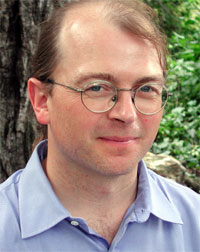
SETH LLOYD is Professor of Mechanical Engineering at MIT and a principal investigator at the Research Laboratory of Electronics. He is also adjunct assistant professor at the Santa Fe Institute. He works on problems having to do with information and complex systems from the very small—how do atoms process information, how can you make them compute, to the very large — how does society process information? And how can we understand society in terms of its ability to process information?
His seminal work in the fields of quantum computation and quantum communications — including proposing the first technologically feasible design for a quantum computer, demonstrating the viability of quantum analog computation, proving quantum analogs of Shannon's noisy channel theorem, and designing novel methods for quantum error correction and noise reduction — has gained him a reputation as an innovator and leader in the field of quantum computing. Lloyd has been featured widely in the mainstream media including the front page of The New York Times, The LA Times, The Washington Post, The Economist, Wired, The Dallas Morning News, and The Times (London), among others. His name also frequently appears (both as writer and subject) in the pages of Nature, New Scientist, Science and Scientific American.
THE CYCLIC UNIVERSE: PAUL STEINHARDT [9.16.02]
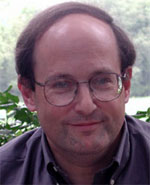
...in the last year I've been involved in the development of an alternative theory that turns the cosmic history topsy-turvy. All the events that created the important features of our universe occur in a different order, by different physics, at different times, over different time scales—and yet this model seems capable of reproducing all of the successful predictions of the consensus picture with the same exquisite detail.
THE INFLATIONARY UNIVERSE:ALAN GUTH [9.16.02]
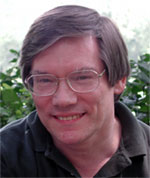
Inflationary theory itself is a twist on the conventional Big Bang theory. The shortcoming that inflation is intended to fill in is the basic fact that although the Big Bang theory is called the Big Bang theory it is, in fact, not really a theory of a bang at all; it never was.
THE EMOTION UNIVERSE: MARVIN MINSKY [9.16.02]
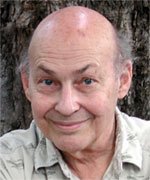
To say that the universe exists is silly, because it's saying that the universe is one of the things in the universe. There's something wrong with that idea. If you carry that a little further, then it doesn't make any sense to have a predicate like, "Where did the universe come from?" or "Why does it exist?"
THE INTELLIGENT UNIVERSE: RAY KURZWEIL [9.16.02]
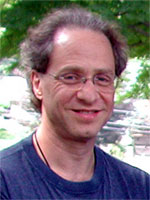
The universe has been set up in an exquisitely specific way so that evolution could produce the people that are sitting here today and we could use our intelligence to talk about the universe. We see a formidable power in the ability to use our minds and the tools we've created to gather evidence, to use our inferential abilities to develop theories, to test the theories, and to understand the universe at increasingly precise levels.

WHICH UNIVERSE WOULD YOU LIKE?
Five stars of American science meet in Connecticut to explain first and last things.
August 28, 2002
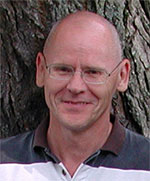
They begin a free-floating debate, which drives them back and forth across the universe. Guth encourages the exploration of black holes, not to be confused with cosmic wormholes, which Kurzweil — just like the heroes of Star Trek — wants to use as a shortcut for his intergalactic excursions and as a means of overtaking light. Steinhardt suggests that we should realize that we are not familiar with most of what the cosmos consists of and do not understand its greatest force, dark matter. Understand? There is no such thing as a rational process, Minsky objects; it is simply a myth. In his cosmos, emotion is a word we use to circumscribe another form of our thinking that we cannot yet conceive of. Emotion, Kurzweil interrupts, is a highly intelligent form of thinking. "We have a dinner reservation at a nearby country restaurant," says Brockman in an emotionally neutral tone.
























